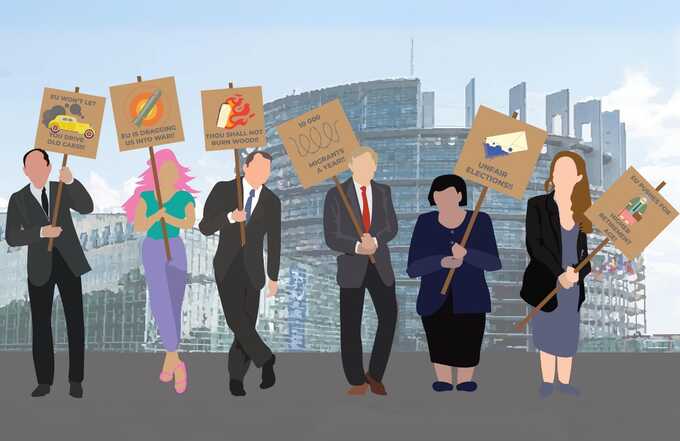Old cars, immigrants and war – how EU related misinformation is spread in the Baltics?

If you wish to discredit the EU in the Baltic states, spread green lies and half-truths – for example, that the EU will immediately force everyone to drive electric cars, stop old cars from being repaired and ban heating with firewood.
Ahead of the upcoming European Parliament elections, these have been among the most popular deceptions in Lithuania, Latvia and Estonia. But in general, this period has passed quietly and without major disinformation scandals.
It would have been even more peaceful if politicians themselves did not create various lies to mobilize voters. In Latvia in particular, several parties including most popular with voters have been actively spreading disinformation about the Green Deal, EU migration policy and the work of the government. This is largely done through TikTok, where the amount of active parties and candidates has increased compared to local parliamentary elections just a few years ago.
“EU will not let you drive old cars”
In recent years, environmental protection in Europe has become one of the main topics of deception, alongside Covid, the Russian invasion of Ukraine, LGBT+ rights and various conspiracy theories. The Baltic states are no exception. In the run-up to the elections, these falsehoods have been reinforced in the context of the EU Green Deal.
In all three countries, myths surrounding electric cars are expressed in different ways. Social media deceivers and anti-green politicians are accompanied by clickbait sites. In Latvia, one of them published an article at the end of May with the headline: “We will not be allowed to drive internal combustion engine cars by 2030”. The article does not give any reason for this – it only implies that the author attributes this to the supposedly huge taxes that people will not be able to pay. Meanwhile, one of the parties currently not represented at the parliament – the New Conservative Party – published an promotional poster with the slogan “Time to put the brakes on the Green Deal”. The poster also states that “older cars will be allowed”, as if there had been plans to ban them. The party’s number one candidate, Talis Linkaits, was Latvia’s transport minister four years ago and at the time was himself pushing for higher taxes on older cars.
The EU has no plans to ban the use, repair or sale of old cars. Member states have only agreed that, effective 2035, new cars with internal combustion engines will no longer be sold.
In addition to these locally produced deceptions, fact-checkers have reported about electric car myths that circulate from country to country. For example, that the electric police vans in France or charging stations in Australia are actually powered by fuel generators.

In Estonia and Lithuania, the rumor about the repair ban was accompanied by a conspiracy theory that it’s part of a EU plan to encourage people to buy new, more eco-friendly vehicles. This theory was also popular elsewhere in Europe. Estonian Delfi fact-checker Kaili Malts notes that Estonia is currently trying to introduce a new car tax, and such misleading information may give the impression that this is being done under pressure from the EU. However, this is not true. Malts believes that in some parts of society there is resistance to green ideas and many people do not distinguish between the EU and Estonian initiatives.
“Thou shall not burn wood”
In Latvia, shortly before the elections, another popular myth about the Green Deal made a comeback. It was claimed that due to the EU policies it will be illegal to heat homes using firewood, briquettes and wood pellets. About a year ago, the Latvian Forest Owners’ Association spread this myth to pursue its own business interests.
In 2023, one of the proposals in the EU Renewable Energy Directive was to limit support for using wood at large boiler houses that run on woodchips. The proposal was not supported. The use of firewood for heating is not prohibited by the Directive or by Latvian law.
This became a hot topic in Latvia, because it is one of the most forested countries in the EU and one of the leaders in the use of wood for heating. Before the EP elections, several populist parties ran with this narrative, flooding social media with one false claim after another.

The loudest among populists is Latvia First, which, a few years ago under the leadership of former oligarch Ainārs Šlesers emerged as an anti-vaxxer advocate and which until February 24, 2022 had been calling for closer friendship with Russia. Now, its representatives, among whom there is no shortage of conspiracy theorists, regularly tell their tens of thousands of followers that the Green Deal is dangerous, it will drive Latvia into bankruptcy and many of its residents into poverty. Several parties also use the old myth that Latvia is the greenest or one of the greenest countries in Europe and therefore does not need any EU green policy. It should be noted that the story of Latvia being the greenest country in the EU, according to Yale University and Columbia University’s Environmental Performance Index (EPI), was true 12 years ago, but not anymore.
“10,000 immigrants a year”
In Latvia, before the election, populist parties also tried to scare the public with stories about migrants. Only recently, a candidate of the National Alliance, which had become an opposition party after many years in government, said on TikTok that “it looks like Europe will be destroyed not by war, but by another disaster”, namely, immigrants. Later, other candidatesspread the claim that the recently adopted EU Migration Pact could result in Latvia having to take in 10,000 immigrants or pay 200 million euros a year (actually 99 people or EUR 2 million). This unsubstantiated claim was repeated by the aforementioned party Latvia First.
“Unfair elections”
As usual, disinformators, some of whom are now also election candidates, tried to raise suspicion that the EP election results would be falsified. In Estonia, the conservative populist party EKRE has been spreading rumors that the elections are not fair. It argued that the party’s popularity ratings reported by the media were lower than they should be. In Latvia, one of the main disinformation actors Rūdolfs Brēmanis called not to participate in early voting, claiming that according to the insider information the votes would be falsified. Brēmanis is one of the anti-vaxxers who gained popularity during the pandemic. Now, like other such populists, he considers himself a politician and runs for election. Meanwhile he has also been slandering the state, spreading various conspiracy theories and Kremlin disinformation.
Across the border, Lithuanian populists tried to sow doubts about the legitimacy of the Lithuanian presidential election. They compared Lithuania with North Korea and Russia because there were no observers from the Organization for Security and Co-operation in Europe (OSCE) present. The presidential election, which concluded after two rounds at the end of May, probably stole the attention away from the EP elections. According to Aistė Meidutė from Delfi Lithuania before the European elections there wasn’t more EU-related disinformation than usual.
“EU pushes for higher retirement age”
In early May, Latvia was swept by yet another EU-related topic of misinformation. Several well-known populists alleged that the EU, together with other international organizations, was asking Latvia to raise the retirement age to 75. This was not the case, and Latvia itself has no plans to raise the retirement age (currently 65). This is a particularly sensitive issue in a country with one of the shortest life expectancies and one of the lowest pensions in the EU. This is probably why the lie quickly became viral on Facebook and TikTok, where posts and videos with this claim reached a total of at least 300,000 people. The original source of this lie was the aforementioned Bremanis.
“Europe is dragging us into war”
Kremlim disinformation is rife in the Baltic states. Kaili Malts from the Estonian Delfi points out that it mostly consists of claims about the West joining the war in Ukraine. For example, in Estonia, the Russian Foreign Ministry’s lie that the country has sent almost 200 mercenaries to Ukraine has recently been circulated. Similar allegations were made about the French army. Also, the old lie about the US bio-labs in Ukraine is not going away. In both Lithuania and Estonia, the Kremlin’s long-established disinformation about Ukrainian President Volodymyr Zelensky and his family has also garnered a lot of attention. The Ukrainian leader is said to be a drug addict, so his wife Olena Zelenska will run for election instead, while Zelenska’s charitable foundation is accused of running a pedophile network that suppliesorphaned Ukrainian children to the rich people in the West.
In Latvia, such obviously fabricated lies are rarely popular. However, other claims, such as that Russia’s war in Ukraine was actually staged by the West or that Ukraine is weak, corrupt and has no chance of victory, are still being circulated, especially on TikTok. In Latvia, party For Stability!, a supporter of the Kremlin narrative, that claims there is only one choice in these elections – war or peace – has a good chance of winning a seat in the EP. It openly tells voters that the EU means losing independence, and the union’s current leaders are trying to drag us into a new arms race which has no room for welfare concerns.
To the surprise of many, a few years ago this party was elected to the Latvian parliament through savvy use of TikTok. It didn’t go unnoticed, and this time there were many more politicians active on TikTok – especially those representing the more radical parts of the society. Needless to say, their messaging there is quite different from what they say, for example, in public broadcaster debates.
Read more similar news:
Comments:
comments powered by Disqus

































